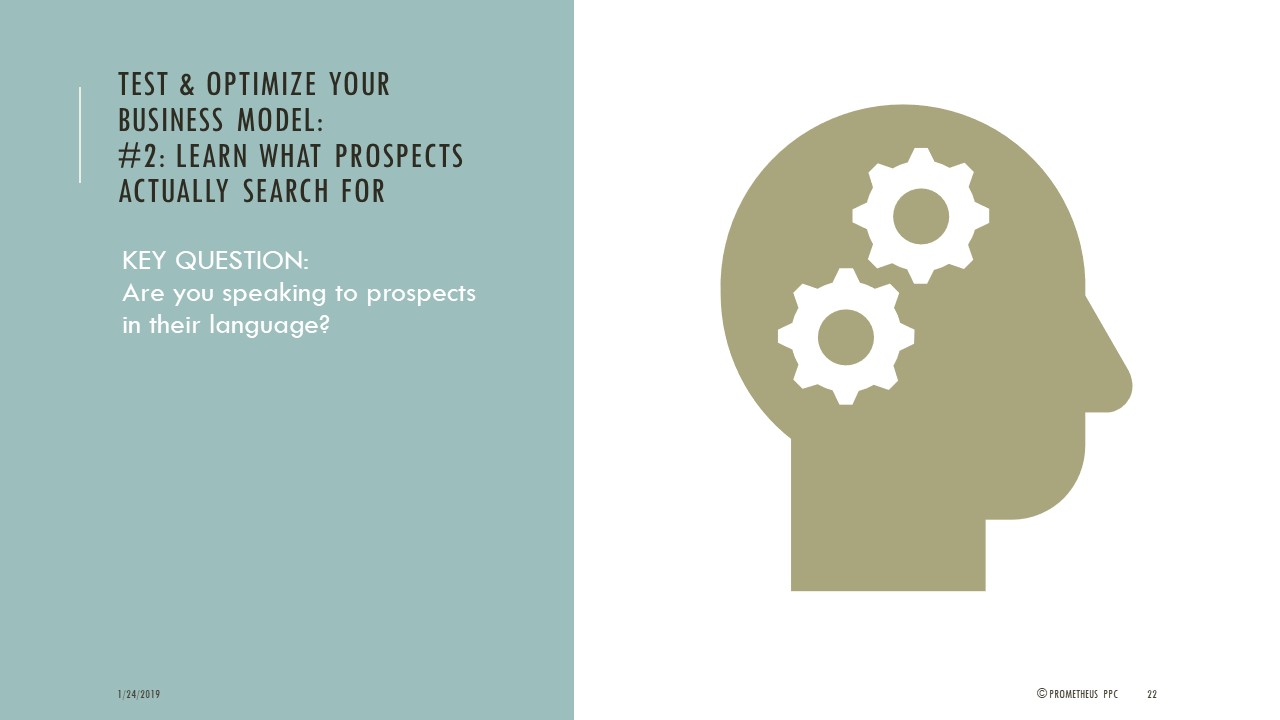Learn What Your Google Ads Prospects Search For

MIT Presentation (part 3 of 8): Learn What Your Google Ads Prospects Actually Search For
Learn what your prospects actually search for in Google using a very handy tool. The results are often quite different from what you’d expect. But effective advertising requires matching your language to your prospects’ language, even when they’re wrong!
This presentation was delivered by Prometheus PPC founder, Andrew Percey, on MIT campus in Cambridge, MA, on January 24, 2019, as part of “The Startup Code 2019” marketing seminar, which he organizes and co-hosts with serial entrepreneur Kenny Goodman. The attendees were MIT alumni, faculty, grad students and other members of the MIT community.
While this presentation includes specific advice for startups, the advanced strategies & tactics described can be used by any business that is looking to refine or troubleshoot their business model and marketing plan.
Video (part 3 of 8)
PDF slides (part 3 of 8)
Links to all posts in this presentation series, including videos, slides & transcripts:
- Full Presentation: 5 Ways to Test & Optimize your Business Model with Google Ads
- Introduction: What is Google Ads and Why Use It?
- How to test & optimize your prospect targeting, messaging and sales flow:
- Method #1: Learn Your Available Prospect Volume with Google Ads
- Method #2: Learn What Your Google Ads Prospects Actually Search For
- Method #3: Learn Which Marketing Messages Engage Your Google Ads Prospects
- Method #4: Learn Which Business Offers Resonate with Your Google Ads Prospects
- Method #5: Learn How to Stand Out from Competitors in Google Ads
- Conclusion: Best Google Ads First Steps Plus Tools & Resources
- Q&A: Google Ads Questions from Startup Founders
See all “Startup Code 2019” presentations and resources
See all MIT marketing seminars
Transcript of Presentation (part 3 of 8)
Method #2: Learn What Your Google Ads Prospects Actually Search For
Number two, we can test and learn what prospects actually search for. Are you speaking to prospects in the language they’re using, which is very important. I’ll show you some examples here. And I thought this quote encapsulates it well – “Good marketing makes the company look smart. Great marketing makes the customer feel smart.” And that’s what you want to go for here. If you speak in their language and talk about their needs, you’re helping them to feel smart.
What’s an example of that? Well, I’m going to go back to the robot example here. Let’s say your product plan is for a tiny robot vacuum called the iMicroVac. And your messaging is the micro robot vacuum for tight spaces. Do you see any problems with that possible messaging?
[audience: “No one is searching for that.”]
No one is searching. Look at the top there, it doesn’t even get to the 10 searches per month. Google can’t even count how many there are, because there’s too few. So if this is what you want to market, you’ve got to realize that that right now, there is no one out there searching on this, which is going to make it very difficult. You know, there are ways you can bid on different terms, bring them to the same sort of content. But if you speak their language from the beginning, so you’re getting the keywords that they’re typing in, your ads use the same language, your website uses the same language, it’s going to connect and convert far better. And again, this just gives you very good feedback, maybe this is not the right area to go after.
Here’s another example, Solar Panel example. So let’s say your product plan is to create a product called Hyper PV Panels. It’s the lightweight photovoltaic panel with 80% greater energy efficiency. That sounds great. But again, is there a problem with this, a potential problem here? Because if you look at the numbers, 165,000 searches a month for solar panels, only 880 for photovoltaic panels. Some of you might know that those two things are not synonymous. Solar panels is a broader category that includes things like solar thermal collectors, but that’s not what most people are looking for. And if you know that, if you know that there’s a difference, you know, darn it, you’re right. You’re right, and you should feel good about that.
But the question is, do you want to be right or do you want to have customers? This is what they’re searching for. Don’t spend your time trying to correct technical misconceptions. Spend your time trying to grow your business. So if you want to reach them with your product, call them solar panels. And you can find examples of this in any space out there.
So if your product language doesn’t match your target customer search language, well, then what can you do? Honestly, there’s only one thing to do – change your language. As much as you might love it, as much as it might be technically correct, change your language to match what the folks out there are going to be looking for, make them feel smart, make it easy for them to find your product.
